
REPORT ERC EVENT 10 NOVEMBER 2022
Let’s grasp the momentum and move forward
Themed around EmPowering Industry the call for collaboration and acceleration was clear in our conference held on 10 November 2022. In the interactive setting it was evident to the audience and speakers that the energy transition is not a challenge in its self. Society faces multiple challenges, such as the nitrogen situation and the impact on the ecological system. We cannot afford to address these challenges in isolation or by modality, but we should encounter all these developments in a joint approach.
At the Shell office in The Hague, presenters and ERC members met to discuss the role of electricity in the future sustainable energy system. On behalf of the steering board, Martine Hoeksma (Shell) and Koenraad van Hasselt (TenneT), placed the event topic in the context of the ERC annual theme, CONNECT TO ACT. Hosted by Shell and TenneT, the event provided an exciting program filled with practical examples from industry, presentations, panels, audience discussions and interviews on stage, all focused on the theme of this event: (EM)POWERING INDUSTRY. As Koenraad stressed: “A highly relevant topic, now more than ever”.
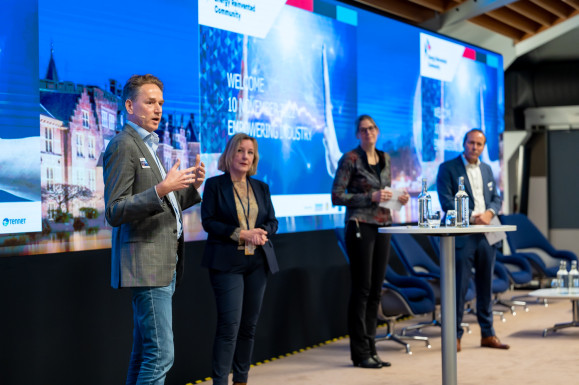
The morning program was kicked of by Eveline Otten and Andreas ten Cate, both in the capacity of their respective roles in the Power to Industry (P2I) working group. Eveline, chair of the working group, explained the key focus areas of the P2I workgroup and how these fit in the overall energy transition plans for the power and industry sector. Andreas, Program Manager Electrification at the TKI Energie en Industrie, introduced the Roadmap Electrification in the Industry and its key findings. The Roadmap provides an indication of what needs to happen to realize the impact of industrial electrification by 2030 and the implications to full implementation in 2050. Andreas urged: “The job to be done is huge!”
The respective focus group sessions in the morning shared insights, practices and developments in the areas of Digital Energy, Heat transition, CCUS and Offshore Energy & Community Engagement. For example, the latter organized a joint session on North Sea energy hubs, focusing on the need to technically, economically ánd socially innovate the energy system, including prioritizing the care for the ecological system and broadening our scope to the general public, especially seen in the light of the challenges we face with the human capital agenda. Please visit the FORUM in the member section of the ERC website, to further explore the topics that were discussed in the other groups.
In the afternoon session moderator Sofie van den Enk, Martine Hoeksma (Shell) and Koenraad van Hasselt (TenneT) kicked off the plenary program. In a setting-the-scene Maxine Tillij (Ministry of Economic Affairs & Climate) and Robert Kuik (TenneT) kicked of the plenary afternoon session, explaining that connecting people, ideas, disciplines and organisations will be key to come up with solutions to speed up the energy transition. Robert illustrated this by explaining the challenges that we face in the grid: “Speeding up is our biggest challenge.” Maxine added: “In order to prioritize, government needs to understand the infrastructural plans of the industry, and as a government we need to define what and how to enable this, whilst accepting that we need to live with uncertainties.” Working in energy clusters will definitely help, Maxine and Robert stressed. Maxine concluded with an open invitation to the people in the room to share their input for a joint long-term energy transition vision, which is currently being put together by the government, which has just announced the launch of a National Program Sustainable Industry.
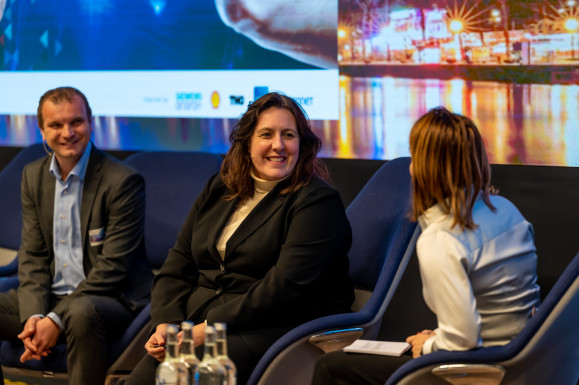
In a series of practical examples, Frederiek Doedijns (Stedin), kicked off with a case study of Stedin in the port of Rotterdam. Sharing a perspective from a regional network operator, Frederiek presented two examples to illustrate the key role of data to drive flexibility, supporting grid balancing. Richard Cooper (Shell), explained how today’s steam cracking furnaces relying on fossil fuel combustion to generate heat, can be future proof once the energy grid becomes increasingly renewables driven. Using clean electricity to heat steam cracking furnaces could become one of the routes to decarbonise petrochemical manufacturing, a route currently explored in a project by Shell, Dow, TNO and ISPT. This excellent example of genuine cross-company collaboration has shown the first tangible results with the successful start-up of an experimental e-furnace unit at the Energy Transition Campus Amsterdam, The Netherlands, this past June. Douwe Tuinstra (Nobian), presented E-flex to the Max, showing how Nobian, using a digital solution, has reengineered its processes and adapted a large factory to match its energy consumption with the available electricity. The increasing share of wind and solar energy means there are more fluctuations in the power supply. When more or less electricity is available, Nobian will adjust the production of the chlorine plant in Rotterdam accordingly. Marnix van Alphen (Vattenfall) discussed four examples of the Electrification Revolution Projects, showing how Vattenfall is cooperating in industry with companies for the production of CO2-free steel, green hydrogen and a pilot for alternative aviation fuel. Marnix stated: “These partnerships with industry are important in the development of new solutions to achieve the climate goals.”
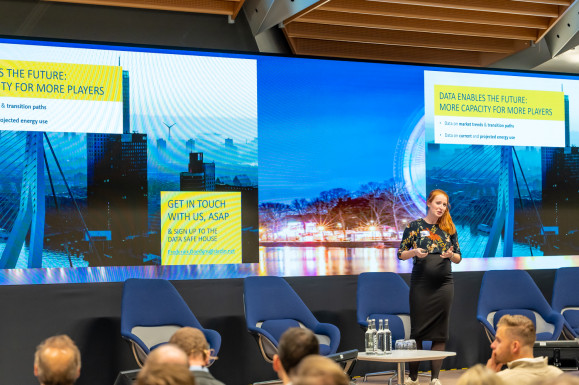
In a short video by the International Business Research (IBR), students created awareness for an offering for Dutch companies that want to expand their business to new markets, such as in Ecuador and Colombia. In the study project facilitated by the University of Groningen, students offer tailor-made research with an economic and business approach against cost price, varying from general local market analysis to detailed partner analysis.
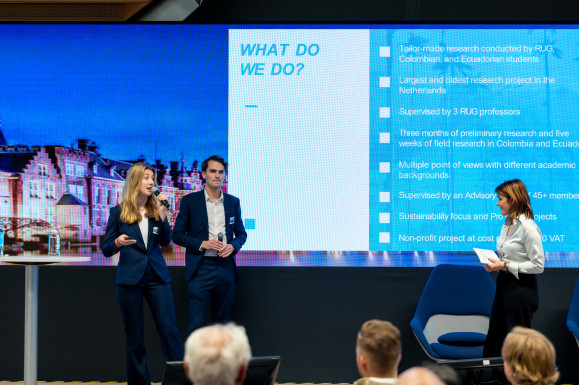
In a panel discussion, moderated by Sofie van den Enk, Maxine Tillij (Ministry of Economic Affairs & Climate), Richard Cooper (Shell), Michelle Prins (Natuur & Milieu) and Robert Kuik (TenneT) discussed solutions, collaboration, balancing demand and supply in the light of (em)powering industry. Michelle noted that it is good that ERC organised this event on electrification of industry, as this topic often receives less attention in the energy transition. She underlined: “Goal setting will help us to put theory into practice.” Maxine added: “Indeed, we need to set clear goals and stimulate industry to put all in place to achieve them. We also have to use the instruments of normalization and prizing when the change does not happen in the pace we need. Richard stressed that: “We must act now and implement technologies available today to meet our 2030 climate goals, but at the same time we must develop new disruptive technologies that will be required to meet our ultimate goal of Net Zero Emissions by 2050”. Robert concluded: “I am optimistic, we know what we are heading for.”
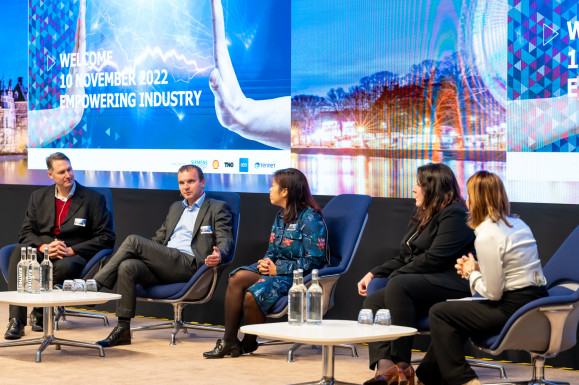
Keynote speaker Peter Molengraaf (Topsector Energie) spoke about electricity in general. Peter explained that with our assets in natural gas the Dutch unfortunately do not have a real electricity mindset, unlike the Scandinavian countries (hydro) and France (nuclear), whilst the electrification of industry is of the utmost importance now. He continued with some initiatives to tackle this challenge. Peter urged: “So we better find the right talent, learn and build up knowledge and fast!” The development of the electricity grid of the future is expected to be on target, hence to realize a 70% CO2 reduction in 2030 and be fully CO2 neutral in 2045. Peter concluded: “We need to ensure that we expand and optimise the grid infrastructure, reduce obstacles and balance the market.“
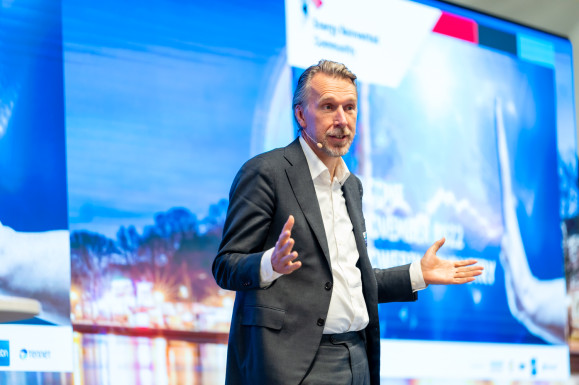
Watch our short video of the event here.
All presentations as well as videos of the day and the photos taken can be found at the website www.energyreinventedcommunity.com. Login to your personal account.
Go to FORUM, select EVENTS and select 2022-11 "CONNECT TO ACT - EMPOWERING INDUSTRY.
Looking forward to meeting you again in an inspiring meet up in 2023!





